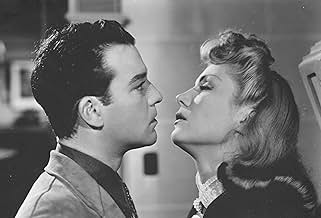Ajouter une intrigue dans votre langueA middle-age woman and a young composer live a tragic romance.A middle-age woman and a young composer live a tragic romance.A middle-age woman and a young composer live a tragic romance.
- Réalisation
- Scénario
- Casting principal
- Récompenses
- 1 victoire au total
Avis à la une
I wish I could be as generous and appreciative as the viewer that wrote the only review so far --until mine as a second one-- for this movie. Let's assume that I was prejudiced to start with by the poor quality copy shown on "You Tube" (where I found it) plus the reading of an overlapped announcement that this movie was going to be called "Menopause", but thanks to its protagonist, Mecha Ortiz, got the name it has been known for: "El canto del cisne" -- "The Swansong", a long shot from that contraption suggested by... the producer maybe, or his wife? well, at least Mecha had good taste and a keen perception of the ridiculous.
Enough of that.
From the very start one is very apprehensive watching a couple of ballet dancers dancing away behind the running title and cast names (insinuation of an arty movie coming along --ballet and classical music-- so audience, be prepared) where the male dancer is incapable to hold up a position without failing ungracefully (it was not supposed to be funny, but the highest expression of ballet dancing) and from there on the couple of scenes I was able to stand before sparing myself the view of this relic (as old looking as the Christopher Columbus caravels) were so outdated and amateurish in its playing that director and cast were obviously total amateurs in their profession.
I think that as much as I'm subjected once in a while to profound nostalgia for the old Argentinian films, every time I try to watch one of them I come out scalded by the experience, because that cinema was very poor, dated and pontifical already in its own time (church intervention) done with a very low budget and ancient techniques even for that time and unfortunately not a great loss if nowadays one misses them.
Nostalgia can be a very deceiving adviser...
Coming to the present time I think that now, a good Argentinian film can be as good as any film produced anywhere else in the rest of the world.
Enough of that.
From the very start one is very apprehensive watching a couple of ballet dancers dancing away behind the running title and cast names (insinuation of an arty movie coming along --ballet and classical music-- so audience, be prepared) where the male dancer is incapable to hold up a position without failing ungracefully (it was not supposed to be funny, but the highest expression of ballet dancing) and from there on the couple of scenes I was able to stand before sparing myself the view of this relic (as old looking as the Christopher Columbus caravels) were so outdated and amateurish in its playing that director and cast were obviously total amateurs in their profession.
I think that as much as I'm subjected once in a while to profound nostalgia for the old Argentinian films, every time I try to watch one of them I come out scalded by the experience, because that cinema was very poor, dated and pontifical already in its own time (church intervention) done with a very low budget and ancient techniques even for that time and unfortunately not a great loss if nowadays one misses them.
Nostalgia can be a very deceiving adviser...
Coming to the present time I think that now, a good Argentinian film can be as good as any film produced anywhere else in the rest of the world.
A high quality movie, with an excellent visual level. Christensen fulfills great moments in several sequences; Cinema is there, no doubt. From the scene when Mecha Ortiz comes up it is understood that the film will go round this queer personality and her relationship with the other characters. The main character introduces a a strange environment almost artificial. Passion arises between Flora (Ortiz) and Miguel Angel (R.Escalada)along with their sufferings. The way the camera works the different scenes speaks about a director who really knows his job. An example of this is when Flora decides to commit suicide. One of the most sincere performances she gave to the cinema.
Le saviez-vous
- ConnexionsReferenced in Preserving Memory: Fernando Martín Peña on Argentine Cinema (2024)
Meilleurs choix
Connectez-vous pour évaluer et suivre la liste de favoris afin de recevoir des recommandations personnalisées
Détails
- Durée1 heure 49 minutes
- Couleur
- Mixage
- Rapport de forme
- 1.37 : 1
Contribuer à cette page
Suggérer une modification ou ajouter du contenu manquant

Lacune principale
By what name was El canto del cisne (1945) officially released in Canada in English?
Répondre























